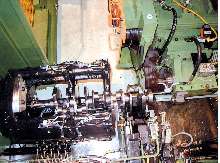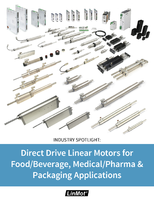Thrust Wall/Pilot Bore Grinder suits crankshaft manufacturing.
Press Release Summary:

Production grinder incorporates kiss grinding of crankshaft thrust wall and internal grinding of pilot bore. Separate external and internal grinding spindles are fitted with cubic boring nitride wheels. Machine centers and supports crankshaft on main journal centerline to hold thrust wall perpendicularity and pilot bore concentricity to main bearings within 0.010 and 0.020 mm, respectively. Offerings include motorized wheel spindles and constrained hydrostatic ways.
Original Press Release:
Combination Thrust Wall & Pilot Bore Grinder Improves Quality and Efficiency of Crankshaft Manufacturing
Waynesboro, Pennsylvania, February 10, 2003 - Landis Gardner announced that the company has developed the first production grinder that combines external and internal grinding operations on crankshafts.
The new machine, which incorporates "kiss" grinding of the crankshaft thrust wall and internal grinding of the pilot bore, replaces two individual turning operations to machine these features. Separate external and internal grinding spindles fitted with cubic boring nitride (CBN) wheels are employed. Landis Gardner engineers say that the combination external/internal grinder can significantly improve the quality of crankshaft manufacturing while reducing cost, work-in-process and floorspace requirements.
A key advantage of the process is the improvement in geometry of the part features, according to vice president of engineering, Russell Kaiser. "By centering and supporting the crankshaft on the main journal centerline, there is a direct correlation between the grinding process and the crankshaft's operation in the engine," explains Kaiser. "This fixturing method enables us to closely hold thrust wall perpendicularity and pilot bore concentricity to the main bearings, something that is impossible to do with turning," said Kaiser. (Perpendicularity and concentricity are typically held to within 0.010 mm and 0.020 mm, respectively.)
Landis Gardner originally developed "kiss" grinding as a more efficient alternative to turning or plunge grinding. The process uses a narrow rimmed CBN wheel-either vitrified bond CBN with water-soluble coolant, or plated CBN with mineral oil-to grind thrust wall faces on automotive and diesel crankshafts, and thrust collars on camshafts. Kiss grinding provides better control of flange face geometry and less likelihood of thermal damage, with the advantages of a more stable and robust process. Kiss grinding is inherently faster than alternative processes. And by eliminating downtime for repeated tool changes, more parts per hour can be produced. Improvement in surface finish from kiss grinding also eliminates the need for a secondary polishing operation.
The first Landis Thrust Wall & Pilot Bore machine was recently installed for grinding crankshafts at a leading automotive engine manufacturer. The application posed a challenge for internal grinding with CBN wheels because of the soft (32 Rockwell-C) steel material. So, Landis Gardner partnered with the Higgins Grinding Technology Center, Saint Gobain Abrasives, Worcester, MA, to evaluate superabrasive grinding wheels for the application. Together, they were able to successfully prove the viability of the using CBN wheels for internal grinding of the pilot bore in soft steel material prior to placing the process into production.
"Our development of the combination Thrust Wall & Pilot Bore grinder has been in response to our customers' need for a more cost efficient processing solution," said Dan Pheil, Landis Gardner president. "As automotive engineers continue tightening tolerances on powertrain components they're finding that, in many cases, grinding is still the best process to satisfy their requirements."
Features of the combination Thrust Wall & Pilot Bore grinder include motorized wheel spindles with wear-free hydrostatic bearings, constrained hydrostatic ways, and a permanent-magnet linear motor wheelfeed drive. Complete specifications on the new Landis Thrust Wall & Pilot Bore grinder can be obtained by contacting Bill Short at Landis Gardner.
Landis Gardner, a member of the UNOVA family of companies, is a pioneer and world leader in the design and manufacture of precision cylindrical, centerless, and single- and double-disc grinding machines The company's Gardner Abrasives operations also designs and manufactures grinding and disc wheels. In addition, Landis Gardner's CITCO operation makes diamond and CBN (cubic boron nitride) grinding wheels, diamond dressing tools, and PCD (polycrystalline diamond) and PCBN (polycrystalline cubic boron nitride) cutting tools.
Headquartered in Woodland Hills, California, UNOVA specializes in the design and integration of manufacturing systems, primarily for the global automotive and aerospace industries. The Company is also a leading supplier of automated data collection and mobile computing systems for industrial, distribution and government markets.




